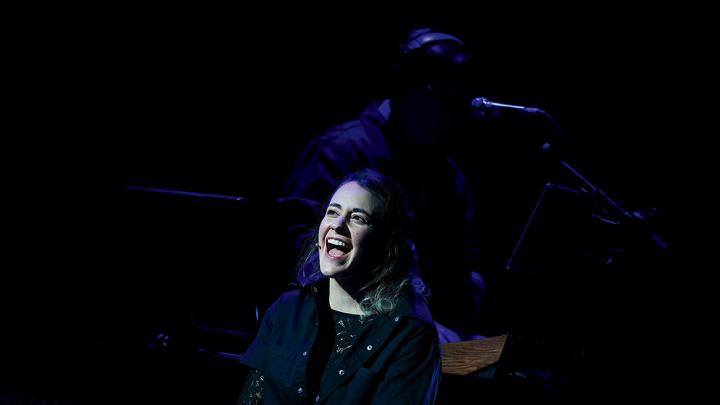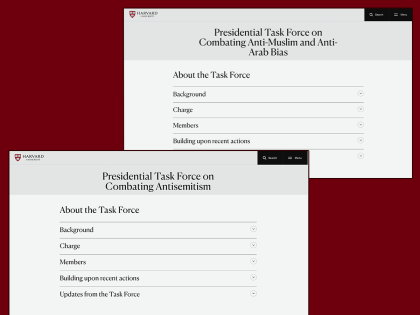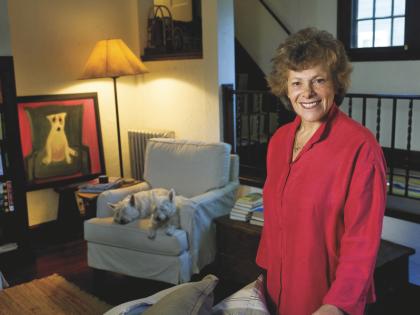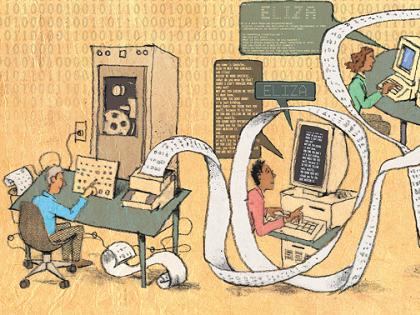When Madeline Benson ’14 became the youngest woman to conduct on Broadway—stepping in to lead the band during a 2016 performance of Waitress as a 24-year-old assistant music director and substitute conductor—it was clear that multiple paths had led her to that moment. One was the classical piano training that began when she was a child. Another was high school musical theater. But a third was the small church in West Hartford, Connecticut, that Benson had attended growing up. Her father was the musical director there, and she started accompanying worship services at eight years old. “I didn’t even question it,” she says. “He needed a hand. It was like our little collaboration.” For many years, the church orchestra consisted of Benson, her older brother, and her mom.
The experience was formative. “I think a lot of my current toolkit comes out of that supportive facilitator role,” says Benson, who’s now a music director and songwriter for Broadway shows and other musicals. “Playing music in a non-performative space, a place of worship, where no one was going to pat me on the back for playing fancy—it was more about creating a space for music to be made.” Other musicians often joined in, and Benson’s father would adapt the arrangements to fit their skills. “It was just that kind of care and understanding about what being part of an ensemble can mean to the people in it, not just to the audience or the congregation,” she recalls. “It pointed to a whole value system around what music is.”
Her first days at Harvard cemented this understanding. As an incoming freshman, she dived into the University’s pre-orientation program in the arts, and during the pageant that capped the whirlwind week, she found herself stationed, unsurprisingly, at the piano. When one scene change began to lag awkwardly and the audience grew restless, Benson improvised a melody based on the play’s scripted songs, and watched as the room’s attention refocused. “I feel like that’s the moment I saw my future,” she says. “Being the hinge between the music and the performance—that really clicked for me.” She spent the next four years learning music direction and conducting pit orchestras, as a joint classics and music concentrator. She also sang a cappella with the Radcliffe Pitches and the Harvard Din & Tonics (where she met her husband, Kirk Benson ’13).
After graduation, Benson moved to New York City and spent a couple of years scrambling as a freelance musician, rehearsal pianist, music copyist: anything that might keep her close to the industry and her instrument. “I was working on productions during the day as, like, the assistant to the assistant,” she says, “and then all night I was listening to audio and transcribing sheet music. It was chaos.” When she first joined Waitress, the show she’d eventually conduct, she was helping notate the music. (Waitress originated at Harvard’s American Repertory Theater, directed by professor in the practice of theatre Diane Paulus, who also directed the play on Broadway.)
In the years since, Benson has accumulated a growing list of music director credits in off-Broadway shows like Bhangin’ It (about a college bhangra dance competition), Rags Parkland Sings the Songs of the Future (a sci-fi tale about a folk music concert), and Walk On Through: Confessions of a Museum Novice (a pop-infused homage to the Metropolitan Museum of Art). In 2019, she was musical director for We Live in Cairo, about the 2011 Egyptian revolution, performed at the American Repertory Theater. This spring, Benson was also on Broadway, playing keyboards for Back to the Future (adapted by the 1985 movie) and conducting for Six (which reimagines Henry VIII’s wives as a glam-pop girl group).
She describes music directing as a vast universe of roles that can stretch from the first spark of an idea in a composer’s mind to a show’s final curtain call. in between, there are the creative team’s deliberations about what the show will actually be—“a phase which can last years”—and all the ensuing workshops and rehearsals, plus orchestrations and arrangements. Music directors not only interpret but often help shape the musical score, and they act as a mediator among the composer, the choreographer, the director, and the musicians. When a show reaches the stage, the music director usually serves as conductor, sometimes also playing an instrument. In Waitress and Six, Benson conducted the band while playing piano.
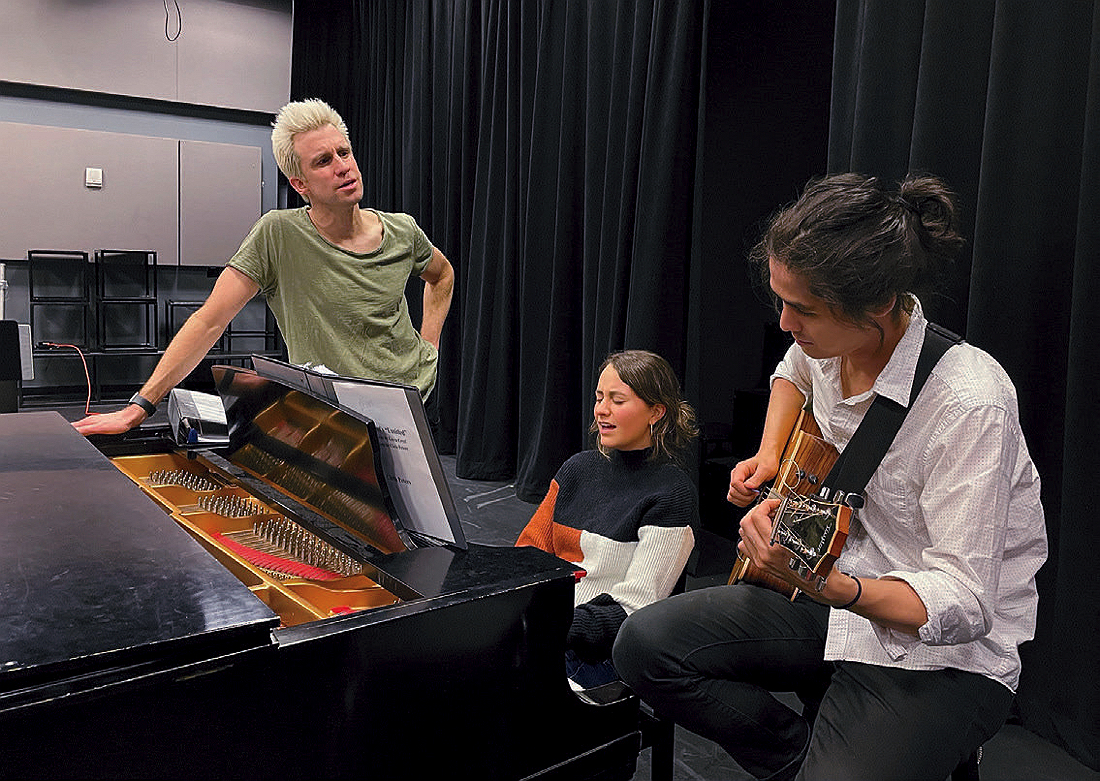
Recently, she has been experimenting with ways to expand the job’s frontiers even further. “The projects that light me up the most,” she says, “have some generative role for me to play.” Last year, she and two collaborators from Walk On Through—Tony-winning actor Gavin Creel, who wrote and starred in the show, and music producer and guitarist Chris Peters—formed what turned out to be a band. Calling themselves The Cuffs, they were at first just trying out early versions of the show’s songs on theatrical audiences; but increasingly, their performances—tight, luminous harmonies and simple instrumentation—have felt like actual concerts. This evolution mirrors a larger phenomenon, she says: “Broadway shows are feeling more like concerts now, and then you watch clips from the Eras Tour, and Taylor Swift is basically doing a musical, right? With that heightened design and theatricality.”
Benson’s newest project, too, blurs lines. She’s adapting the 2010 Disney animated movie Tangled (based on the Rapunzel fairy tale) into a musical, which will be published and licensed for community theaters and professional companies. She and a team are assembling a two-hour show, including some original songs. Benson previously helped adapt two other Disney projects, Descendants and Frozen Jr., but this one is different. “It’s a massive self-guided puzzle,” she says, adding that in addition to the movie, there’s an animated TV series and a version of Tangled performed on cruise ships. In this assignment, she’s part music director, part composer, part arranger, part writer. “I love projects where it feels like I’m inventing the job a little bit,” she says. A spreadsheet helps keep track of everything, but Benson also spends whole days just at the piano, immersing in the music. The work reminds her of her days in church or in high school musical theater. Eventually, this piece will be performed by young people in settings just like those. For her, that resonates deeply. “A lot of what we love about music is universal,” she says. “It’s not that different between a Broadway stage and a middle school.”
